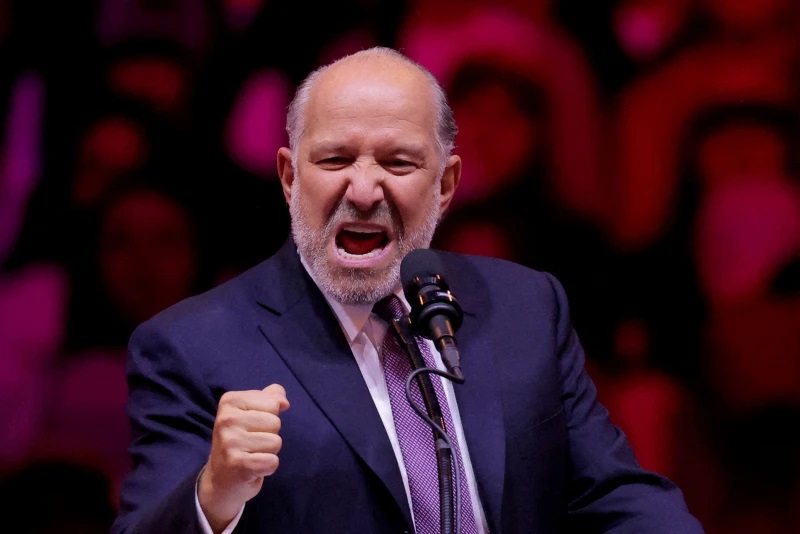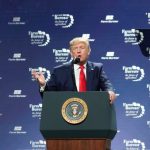
Trump taps Howard Lutnick for Commerce Secretary, signaling tariff-heavy trade strategy. Lutnick has called the tariffs a negotiating tool that could be used to convince other countries to bring down their own levies or to force companies to move production to the U.S.
President-elect Donald Trump’s selection of Howard Lutnick, the CEO of Cantor Fitzgerald, as Commerce Secretary highlights plans to leverage tariffs in trade negotiations, with Lutnick emphasizing their use as both a revenue source and bargaining tool.
Lutnick has called the tariffs a negotiating tool that could be used to convince other countries to bring down their own levies or to force companies to move production to the U.S. He has said Trump would avoid taxes on products U.S. companies don’t make.
Commerce oversees the International Trade Administration, an agency in charge of enforcing trade laws and investigating unfair trade practices.
Of note: Trump said that the Commerce Secretary would have “additional direct responsibility for the Office of the United States Trade Representative.” The phrase means that Trump may try to fold the latter position within the Commerce Department, a move that has been tried before to combine government trade work.
Trump’s trade agenda is heavily focused on imposing substantial tariffs, particularly targeting China. He has proposed a 60% tariff on Chinese goods and 10-20% tariffs on imports from other countries. Lutnick has been a vocal supporter of these tariffs, suggesting they could replace income tax revenue over time. He believes that by making American businesses more competitive through tariffs, it could lead to lower overall tax rates.
Lutnick’s appointment signals an aggressive stance on trade that could lead to increased tensions with trading partners. The Commerce Department plays a crucial role in enforcing tariffs and negotiating trade agreements, which may become contentious under Lutnick’s leadership. Economists have expressed concerns that such high tariffs could lead to retaliatory measures from other nations, potentially resulting in higher prices for consumers and disruptions in global supply chains.
On China, Lutnick has accused the country of being the source of fentanyl in the US, saying that “China is attacking America from its guts.” Kevin Chen, associate research fellow at the S. Rajaratnam School of International Studies, told the South China Morning Post, “There is little question that he will push forward with tariffs That being said, he has also suggested that the tariffs could be used to negotiate trade deals with other countries,” he said. Chen suggested that the choice of Lutnick —alongside other China hawks joining Trump’s team including Marco Rubio as secretary of state and Mike Waltz as national security adviser — could be “very dangerous for U.S./China relations” given the Commerce Department’s oversight of export controls.
Asked about Lutnick’s nomination, Chinese foreign ministry spokesman Lin Jian said he would not comment on U.S. internal affairs but added that a trade war “will not produce any winner and is in no one’s interest.”
Treasury Secretary Possibilities
- Rising federal debt
- Enacting Trump’s tax cut plan
- Helping implement Trump’s tariff plans
- Coming up with pay-for plans
- Keeping inflation low
- Implementing 45Z and other biofuel tax incentive programs (IRS)
U.S. businesses brace for potential Trump tariffs.
American companies are accelerating inventory orders ahead of Donald Trump’s inauguration, fearing the implementation of his proposed tariffs on imports. Trump has suggested levies of 10-20% on all imports and up to 60% on Chinese goods. Firms are also strategizing for potential impacts, including price adjustments and diversifying away from Chinese manufacturers, the Wall Street Journal reports (link).
Tariffs and Pricing Impacts
Walmart acknowledged the retailer would probably raise prices on some goods if Donald Trump moves forward with plans to enact sweeping tariffs. Walmart’s CFO John David Rainey stated that prices on some items may increase but it is uncertain which products might see price hikes due to the tariffs. A Walmart spokesperson indicated that any price changes are speculative, but future tariff-induced costs could burden sensitive shoppers.
Lowe’s words were more circumspect, with the home-improvement retailer’s executives noting tariffs would lift costs but also saying they were waiting to see what happens when the new administration takes office in January.
Walmart said shoppers are resilient but are still spending more on food than they have historically.
Lowe’s said homeowners are still waiting for lower interest rates to embark on big home-improvement projects.
You can now read the most important #news on #eDairyNews #Whatsapp channels!!!
🇺🇸 eDairy News INGLÊS: https://whatsapp.com/channel/0029VaKsjzGDTkJyIN6hcP1K

























